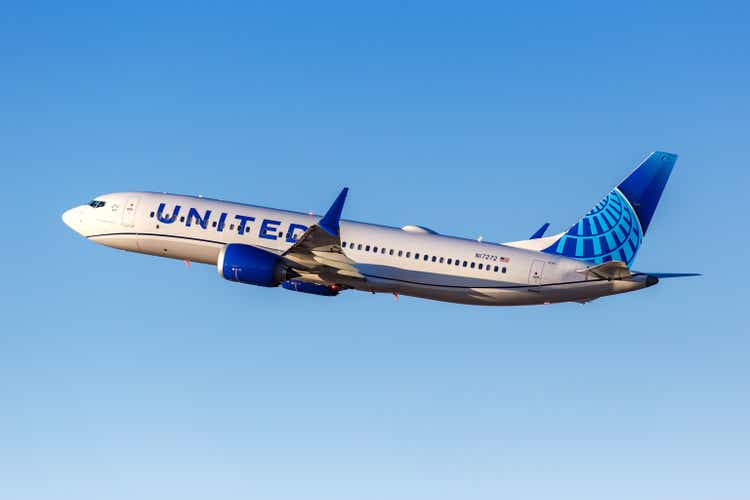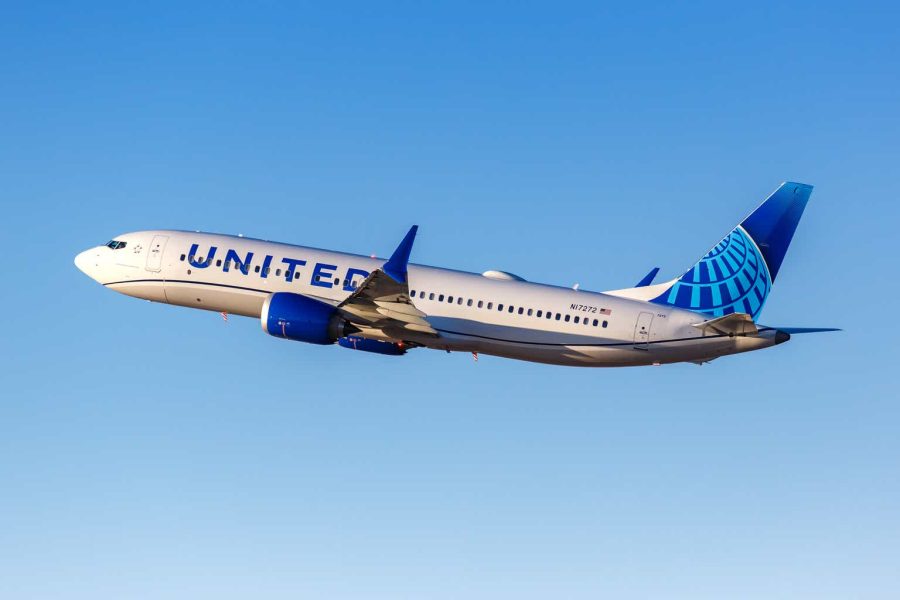Summary:
- United Airlines is favored over Delta following the IT outage.
- The airline sector is normalizing post-Covid, with United well-positioned for higher profitability and potential capital returns to shareholders.
- United trades at 5x 2025 EPS targets, with a projected 14% earnings growth, and has significantly reduced its debt, enhancing financial stability.
Boarding1Now
With a legacy airline struggling with an IT outage, United Airlines Holdings, Inc. (NASDAQ:UAL) has taken flight to post-Covid highs. The airline stock is still incredibly cheap, but whether or not the market will reward the stock with a viable market valuation is a far different story. My investment thesis remains ultra Bullish on United Airlines looking for a further move higher.
Delta Still Highly Profitable
Before the market open, Delta Air Lines (DAL) kicked off the earnings season with a solid Q3’24 report. The legacy airline faced a tough period in the September quarter due to the IT outage causing the cancellation of 7,000 flights.
Despite the tough period, Delta Air Lines still reported a strong EPS of $1.50 as follows:
The numbers are a promising indication of the quarterly report for United Airlines coming up next week after the close on October 15. The consensus analyst estimates are for the following Q3 numbers from the airline:
- EPS of $3.14
- Revenue of $14.7 billion, up 1.7%
The quarterly numbers were already tough due to the overcapacity issues in the airline sector during the quarter. The airlines were all clear on the Q2 earnings reports that industry capacity cuts weren’t going to improve yields until the August/September timeline.
Delta Air Lines reported flat revenue growth and solid profits despite an estimated $550 million hit during the quarter, causing a $0.45 impact on EPS. The management team estimated a $380 million hit from lost revenue due to the flight cancellations and another $170 million boost to costs for accommodating passengers with delayed flights.
What isn’t easily measurable is the brand impact. Heading into the outage, Delta Air Lines was generally viewed as the leading legacy airline and now United Airlines is likely on better footing.
Since the outage on July 19, the stock has far outperformed Delta Air Lines with a 30% gain.

The ironic part is that United Airlines didn’t start pulling away from the stock returns of Delta until the start of September. Delta is embroiled in a public corporate dispute with CrowdStrike (CRWD) and Microsoft (MSFT) and this likely isn’t helping the brand view.
Future Focus
If an investor focuses beyond the Q3 report, Delta guided to much improved Q4 numbers as follows:
Source: Delta Air Lines Q3’24 earnings release
Even with the corporate issues, Delta Air Lines guided to a Q4’24 operating margin of 12% leading to an EPS of $1.60 to $1.85. The holiday quarter isn’t the strongest quarter for travel, yet the airline predicted one of the strongest December quarters in the history of the airline despite warning of slower travel around Presidential elections.
The view here is that United Airlines reports even stronger numbers. Delta Air Lines is guiding to an EPS technically below the consensus estimates of $1.79, but still within the range for a sharp jump from $1.28 last Q4.
The consensus analyst Q4’24 estimates for United are $2.76 per share for a nearly 40% boost from last year. The view here is that the stock isn’t valued based on a sharp jump in earnings followed by a big boost in 2025 numbers.
In a lot of ways, 2025 should be the first year of normalization in the travel sector. The last couple of years were led by revenge travel in 2022 and the reopening up of international travel in 2023 followed by some domestic overcapacity issues in 2024.
The airlines have now adjusted capacity while dealing with aircraft issues from Boeing (BA) delivery issues to Pratt & Whitney engine problems. The end result is a sector entering 2025 with capacity more in line with the normalized travel demand following Covid.
According to industry data, passenger totals have now held above the 2019 levels suggesting a higher level of profits going forward is very possible. Over the key summer months, TSA throughput topped 2.6 million passengers per day while the 2019 average during this peak period was only 2.4 million passengers.
United enters the quarterly earnings report with the stock only trading at 5x 2025 EPS targets of $11.18. The consensus estimates have earnings growing at a nearly 14% clip next year.

The big rally in the last couple of months to reach the post-Covid highs is only a return of the stock to the start of a more normalized valuation. United Airlines still trades at a lower forward P/E multiple with the market still favoring Delta.
Delta has already started capital returns and United can likely flip the switch with positive indications that the debt load is under control. United Airlines ended the last quarter with net debt below $16 billion after producing $3.4 billion in FCF for the 1H’24.
The September quarter is highly profitable allowing the airline to already pre-pay a $1.8 billion loan on the MileagePlus program with an interest rate of nearly 11% saving $200 million in annual interest expenses. The airline only had net interest expenses of $237 million in Q2 and the repayment of higher debt will help eliminate further interest expenses.
At the Morgan Stanley conference, CFO Mike Leskinen was clear capital returns are around the corner with expensive debt paid off and the company favoring stock buybacks due to the cheap value:
This industry needs to get better at returning cash to shareholders. We need to have more regular returns of cash to shareholders. Now, I passionately believe that those returns, when you’re trading at four and five times earnings, should be the form of buyback, not dividend. I think dividend, you need to – a dividend is great and attracts different types of shareholders when you’ve already trading at 10 or 12 times, four or five times it’s so opportunistic to buy back shares.
Our balance sheet now is in a great spot. I talked on the Q2 call of a couple of pieces of debt that we had to repay. We have repaid those pieces of debt. Now my incremental debt cost is 125% to 5.25%. There’s no more expensive debt to repay.
United Airlines announcing a stock buyback in the next few quarters could light a further spark under the stock. Of course, the biggest risk is the stock pulling back after the recent rally due to war in the Middle East or any other issue impacting travel. In reality, airline stocks don’t need a lot of negative views to watch the stocks collapse, no matter the cheap valuation.
Takeaway
The key investor takeaway is that United Airlines is the favored legacy airline stock after the IT outage should lead to some brand damage at Delta Air Lines. In addition, United trades at a cheaper valuation while the stock could easily have an additional catalyst from the announcement of a share buyback in the next few quarters.
Investors should always prepare for an airline stock sell-off, but the stock remains too cheap here and should trade much higher.
Analyst’s Disclosure: I/we have a beneficial long position in the shares of UAL either through stock ownership, options, or other derivatives. I wrote this article myself, and it expresses my own opinions. I am not receiving compensation for it (other than from Seeking Alpha). I have no business relationship with any company whose stock is mentioned in this article.
The information contained herein is for informational purposes only. Nothing in this article should be taken as a solicitation to purchase or sell securities. Before buying or selling any stock, you should do your own research and reach your own conclusion or consult a financial advisor. Investing includes risks, including loss of principal.
Seeking Alpha’s Disclosure: Past performance is no guarantee of future results. No recommendation or advice is being given as to whether any investment is suitable for a particular investor. Any views or opinions expressed above may not reflect those of Seeking Alpha as a whole. Seeking Alpha is not a licensed securities dealer, broker or US investment adviser or investment bank. Our analysts are third party authors that include both professional investors and individual investors who may not be licensed or certified by any institute or regulatory body.
If you’d like to learn more about how to best position yourself in under valued stocks mispriced by the market to start October, consider joining Out Fox The Street.
The service offers a model portfolio, daily updates, trade alerts and real-time chat. Sign up now for a risk-free 2-week trial to started finding the best stocks with potential to double and triple in the next few years.



